
Vol. 6, 2020A new decade for social changeswww.techniumscience.com9772668779000ISSN 2668-7798

Social Welfare: A Synthetic Analysis from the Perspective of
the Main Schools of Economic Thought
Percic Stanislav, PhD
Alexandru Ioan Cuza University of Iasi, Romania
stanislav.percic@uaic.ro
Abstract. The analysis of the meaning of the social welfare is a topic of great interest for
researchers, as well as for policy makers. While some researchers or economists believe that
social welfare is limited to the standard of living of the society, others describe it as a material
and spiritual welfare of the society and make a distinction between the social welfare of those in
need of a special attention from society and general welfare of the whole society. In order to
understand the true meaning of the concept of social welfare, this research focuses on an
incursion into the historical past of the economic thought. The aim of the present study is to
analyse the social welfare or other terms related to welfare from the perspective of the main
schools of economic thought. The research reveals that the representatives of the largest schools
of economic thought have not overlooked terms such as prosperity, happiness, satisfaction,
usefulness, wealth, building a solid foundation to what we know today as social welfare.
Keywords. social welfare, wealth, welfare economy, welfare state, human action
1. Introduction
In a restricted sense, the concept of social welfare is limited to the standard of living of the
society, outlined by the welfare or social protection services provided by the state. For example,
the economist Vaughn Davis Bornet considers the social welfare as equivalent to the term social
protection, giving the following definition: „Social welfare, or rather, social protection,
represents the special services offered and the material assistance provided by the whole
society or only by one part of that to a person considered to be in need.” (Bornet, 1960).
On the other hand, the researchers De Grazia and Gurr (1961) present the concept of social
welfare in a broader form: they describe it as „a material and spiritual welfare of the society”
and make a distinction between the social welfare of „those in need of a special attention from
society”, and general welfare „of the whole society”. They recognize that „social welfare is
closely linked to other types of welfare and that most institutions of the society offer different
types of welfare”. As a result, both public and private agencies are involved in social welfare
activities. Thus, De Grazia and Gurr make the distinction between public social welfare
(provided by the public sector / state) and private social welfare (offered by the private sector).
Professor Walter A. Friedländer defines social welfare as „an organized system of social
services and institutions, designed to help individuals and groups to reach satisfactory
standards of life and health, as well as personal and social relationships that will facilitate
them to develop to their full potential and in harmony with the needs of their families and the
community” (Friedlander, 1961). As can be seen, the social welfare is somewhere at the
101
Technium Social Sciences Journal
Vol. 6, 101-115, April 2020
ISSN: 2668-7798
www.techniumscience.com

interference between state action (organized system) and human action (personal and social
relations).
Social welfare in the broad sense is not limited to the notion of standard of living, but rather
takes into account the quality of life, which includes factors regarding the quality of the
environment (air, soil, water), the level of crime, the degree of drug abuse, the availability of
basic social services, as well as religious and spiritual aspects of social life. In this regard, the
measurement of social welfare depends to a very large extent on the indicator or indicators that
are taken into account: Sustainable or green GDP, Genuine Savings, Human Development
Index etc. (Percic and Apostoaie, 2016).
Italian researchers Lorenzo Giovanni Bellù and Paolo Liberati explain social welfare rather
in financial-monetary terms: social welfare can be reflected by the average income per capita
(Bellù and Liberati, 2006). From their point of view, the distribution of the total income from
the economy can generate two contradictory situations: on the one hand, the equitable
distribution of the total income among the population (as it should be) generates social welfare,
and, on the other, the inequitable distribution of this indicator (as it is in reality) leads to social
inequalities. In conclusion, it can be argued that Bellù and Liberati do not see social welfare in
a capitalist society (a society based on competition and distribution of value according to
merits). According to these researchers, social welfare is rather a state of socialist / communist
society.
It is worth to mention that welfare is closely linked to the notion of project or project
management, because, overall, welfare represents the result of an implemented project whether
we are talking about the project as a country / state (Keman, 2017) or as specific activities
implemented within an institution. For example, the Atlas Project improved the welfare of the
children in foster care from USA (Tullberg et.al., 2017), while the 36 million houses project
implemented during the 2011-2015 in China improved the welfare of its inhabitants (Jiang and
Mai, 2015).
In order to understand the true meaning of the concept of social welfare, research focuses on
an incursion into the historical past of economic thought. The largest schools of economic
thought have not overlooked notions such as happiness, satisfaction, usefulness, wealth,
building a brick at the base of what we today call social welfare.
2. Social welfare in the vision of the classical liberalism
2.1. Prosperity in the vision of the Physiocrats
Based on the meaning of the term physiocrats (from Greek „phusis” - nature and „kratos” -
power), this group of economists advocates for the power of nature in the economy. The
physiocrats were the first to introduce the laws of nature in explaining and describing the
economic life, emphasizing that even human society evolves according to well-defined
principles, fitting perfectly in the natural order of things on earth.
The physiocrats, through their theoretical and practical steps, have come to the conclusion
that the earth, which is the supreme gift from God, is the only productive element that can
generate prosperity. Although the term social welfare will appear later, the physiocratic scholars
used the term prosperity to describe the welfare of the society of those times, which was, in
their view, limited to the net product generated by the proper processing of the land. This net
product, which represents the difference between the accumulated income from the processing
of the land (wealth) and the expenses related to this effort, is the equivalent of the present
national income. Therefore, the physiocrats perceive social welfare or prosperity through the
value of the accumulated income from the economy. Of reference in this case are the words of
102
Technium Social Sciences Journal
Vol. 6, 101-115, April 2020
ISSN: 2668-7798
www.techniumscience.com

Pierre Samuel Dupont de Nemours, who said that „prosperity must be associated with the
maximum possible level of the net product” (Albertini and Salem, 1988).
Another important notion introduced by the physiocrats, later taken over by economists from
all over the world and relevant for explaining social welfare, is the economic circuit. The
economic circuit shows in a rudimentary form the distribution of the net product created by the
society, explaining how the society's wealth ensures the welfare of the whole social community.
Starting from the idea that the driving force in ensuring the flow of the net product is the
individual, the physiocrats describe the society and its structural-functional unit, dividing it into
three social classes (see Figure 1).
Figure 1 The structure of the society in the vision of the physiocrats
Note: * It was tried to introduce in this class also the workers who benefit from other gifts of
nature (for example fishermen or miners), but this did not enjoy unanimous support from the
economists of those times
Source: Elaborated by the autor
The physiocrats argued that only the productive class was engaged in the creation of
prosperity, supporting the economic circuit and the distribution of income within the society.
The other classes, as Francois Quesnay claimed, were only involved in the simple production
of what they consumed.
Although most of the explanations put forward by the physiocrats seem rudimentary and
easy to dismantle, their contribution is titanic to the economic theory in general and to the
understanding of the notion of social welfare in particular.
2.2. The welfare of the nation in the vision of the Classical school of economics
The industrial revolution of the late 18th century has shaken the economic theory put forward
by the physiocrats. Against the background of these major mutations, classical economists,
identified with the French classical school and the British classical school, proposed a sound
economic theory, described by complexity, unity and immutability.
One of the postulates of the social welfare put forward by classical scholars comes from the
context of those times, when thinkers of the same current were caught in two different camps:
the British and the French camps. As the British and the French were in a state of war, the
correspondence of the French and British classics surprises their confidence that only peace can
develop the human personality and, therefore, guarantee a better life.
From the position of staunch supporters of the economic liberalism, the French classics
blamed and discouraged the state interventionism in the economic activity, considering that the
absence of state power in the economy would lead to a better and prosper life. In their view,
government interventions in the fields of socio-economic life, unbalance the system, disturbing
the harmony established within the society.
The representative of the French classicism, Jean-Baptiste Say, in the treaty of political
economy emphasized the unlimited character of the needs of the society against the scarcity of
The sterile class
•which was largely
made up of traders,
industrialists,
bankers, etc.
Salaried class
•which included the
large landowners
Productive class
•which included
individuals caught in
land processing
activities, ie
farmers*.
103
Technium Social Sciences Journal
Vol. 6, 101-115, April 2020
ISSN: 2668-7798
www.techniumscience.com

available resources (Say, 1855). If social welfare is nothing more than the satisfaction of society
by meeting societal needs, then in visions of the French classic (but it is generally valid, since
resources are limited) social welfare will never reach an absolute saturation level. As Say said,
only through the abstention, distribution and rational and efficient consumption of the wealth
of a nation, starting from the resources that are scarce, limited and used alternatively, one can
go towards a relative satisfaction of the unlimited needs of society.
Say also highlighted the importance of the value-utility term. This notion facilitated the
justification of the productive character of all the economic branches, and not only of
agriculture, as the physiocrats argued. In Say's vision, satisfaction is given by the productive
character of an activity of production, while overproduction cannot exist on a free market. The
good functioning of the markets and the accompanying competition were the guarantee of
producing only those goods that were required on the market to satisfy the existing needs.
Although all the economic activities were supported by value-utility, the industry had a special
place and was considered the basic branch of the economy, capable of regulating production
alone, without reaching overproduction situations.
The British classical school proposed viable solutions for the proper functioning of
capitalism in the form of a unique economic theory for those times. Private property along with
free initiative were seen as desirable for economic freedom and, therefore, for meeting the needs
of society.
In The Wealth of Nations, Adam Smith has iterated three postulates of economics, which
are now familiar to all students (Smith, 1992):
(1) The mobile that guides the human being in its activities is the personal / individual
interest.
(2) The invisible hand of competition, by cumulating, automatically transforms the personal
interest of individuals into common interest and common good.
(3) The best governance policy to increase the wealth of a nation is the one that governs /
intervenes the least.
During the construction of the liberal ideology Adam Smith has iterated three basic pillars:
the individual, rationality and pleasure. He argued that the harmony and balance between the
personal interests of individuals and the general interests of society can be ensured by the
existing natural order. The natural order is the guarantor of the pleasure, harmony and welfare
of the society. Individuals do not need state intervention to satisfy their own needs, but they act
according to their particular nature, thereby satisfying the requirements of the whole society. In
this context, Smith introduces the notion of the invisible hand to explain how, through the
individual's free action to achieve his own goals, the wealth of society (the wealth of the nation)
is created. Smith emphasizes the divine force that guides individual interests and passions
toward the general good of society: “We do not wait to eat the goodwill of the butcher, or the
wine salesman, or the baker, because we believe that this is in their own interest. We are not
addressing their humanism, but their selfishness, we are not talking about their needs, but their
interests.” (Smith, 1992).
Also worth noting is Smith's vision of society. He saw it as an entity whose supreme purpose
is to realize material interests (expressed through objectives) and, therefore, to satisfy the
societal needs, which will allow to maximize the pleasure felt by the society.
Although state intervention was not encouraged by the classics, Adam Smith explains the
role and necessity of its interventions. The state was called upon to solve those problems that
could not be overcome by the society guided by the invisible hand: it had to ensure the smooth
running of the economy by creating the favorable conditions for healthy competition, but
without departing from the laissez faire principle, it had to defend itself in the case of external
104
Technium Social Sciences Journal
Vol. 6, 101-115, April 2020
ISSN: 2668-7798
www.techniumscience.com


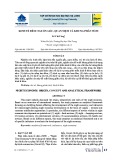
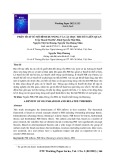
![Tương lai của năng suất: Tổng luận [Nghiên cứu mới nhất]](https://cdn.tailieu.vn/images/document/thumbnail/2021/20210201/caygaocaolon10/135x160/3821612151169.jpg)
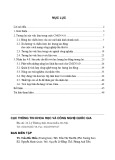
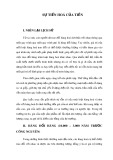
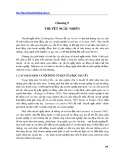
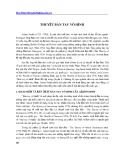
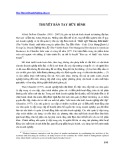
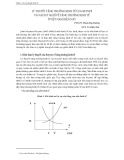


![240 câu hỏi trắc nghiệm Kinh tế vĩ mô [chuẩn nhất]](https://cdn.tailieu.vn/images/document/thumbnail/2026/20260126/hoaphuong0906/135x160/51471769415801.jpg)

![Câu hỏi ôn tập Kinh tế môi trường: Tổng hợp [mới nhất/chuẩn nhất]](https://cdn.tailieu.vn/images/document/thumbnail/2025/20251223/hoaphuong0906/135x160/56451769158974.jpg)




![Giáo trình Kinh tế quản lý [Chuẩn Nhất/Tốt Nhất/Chi Tiết]](https://cdn.tailieu.vn/images/document/thumbnail/2026/20260122/lionelmessi01/135x160/91721769078167.jpg)





